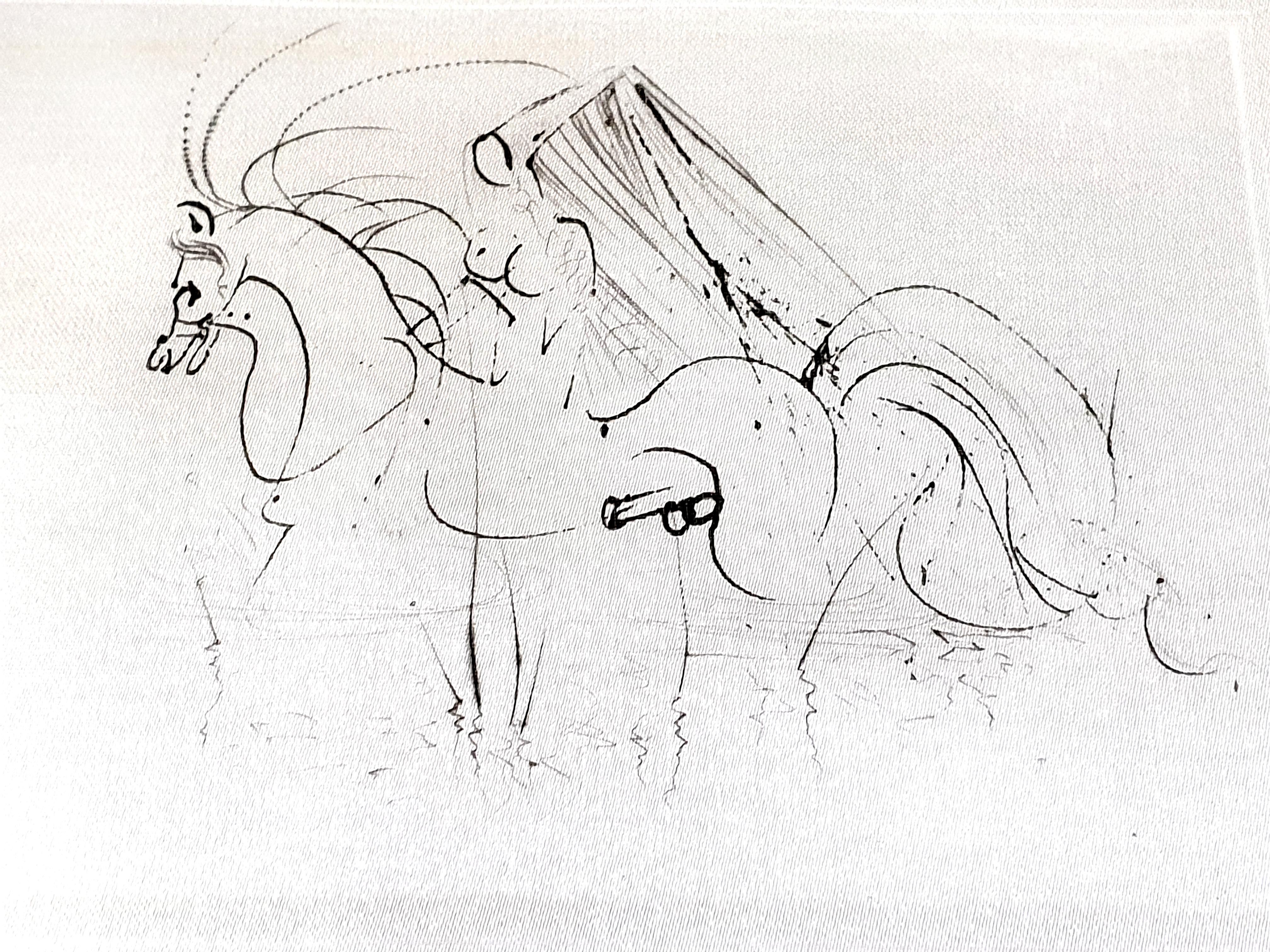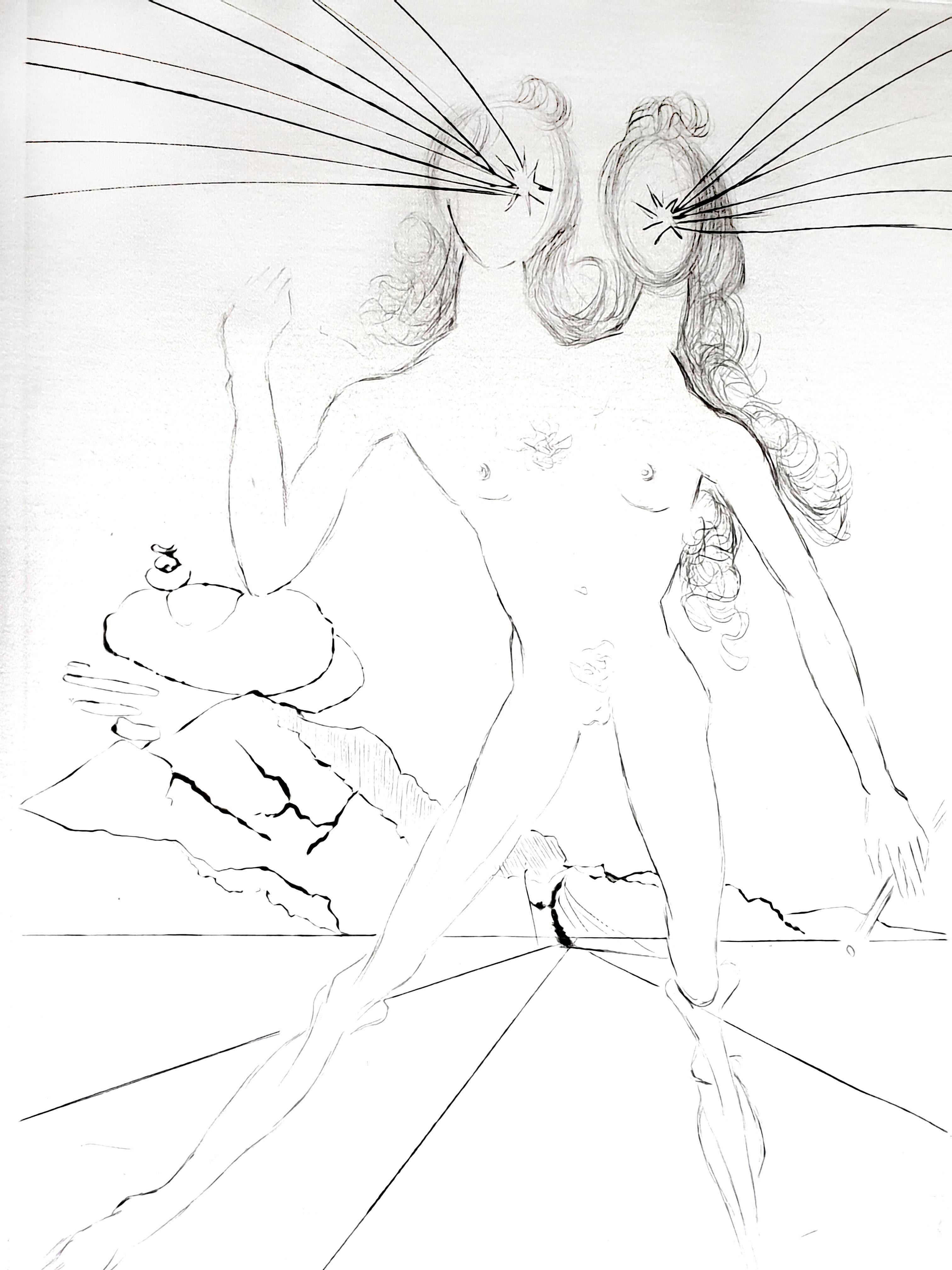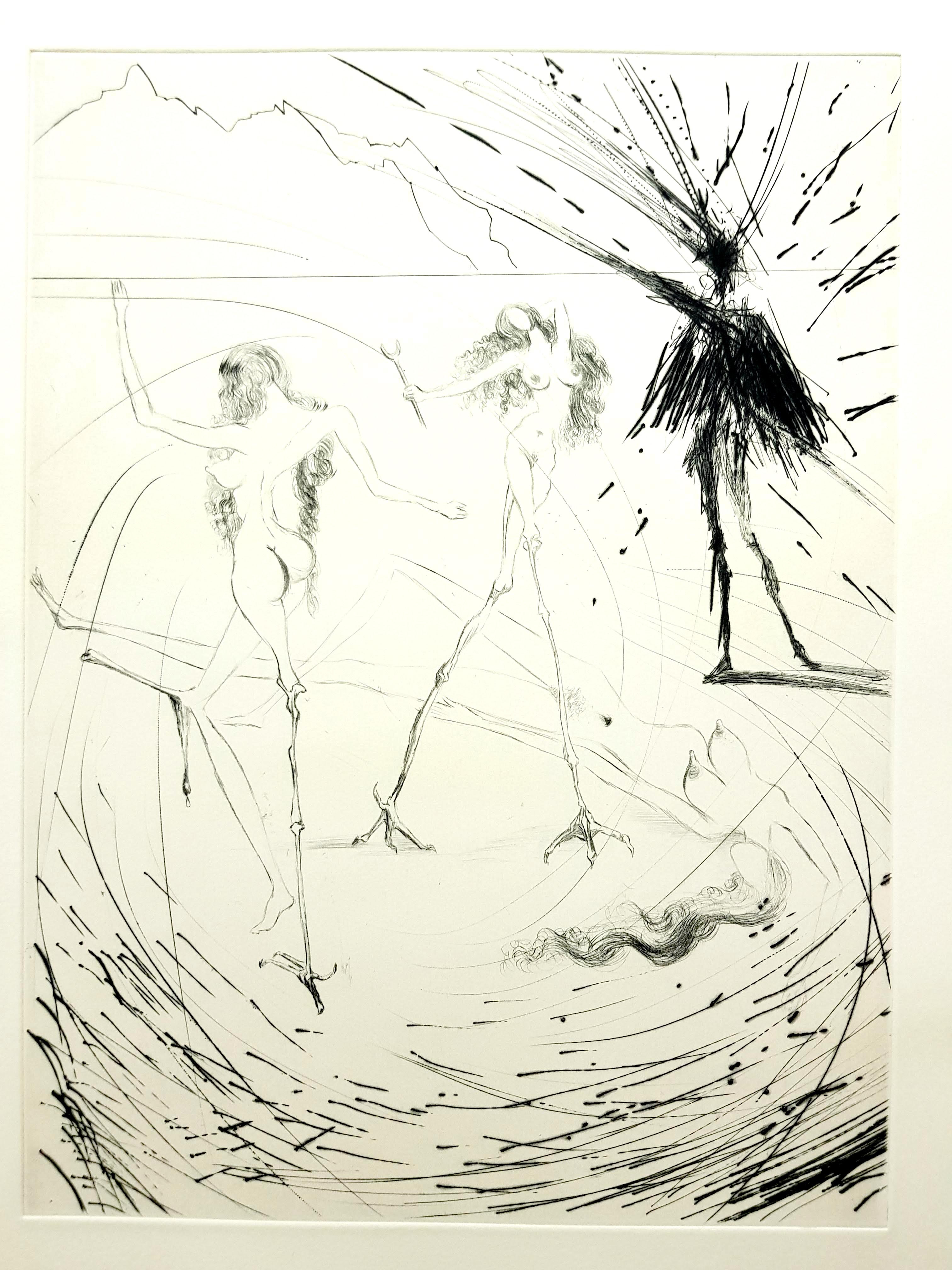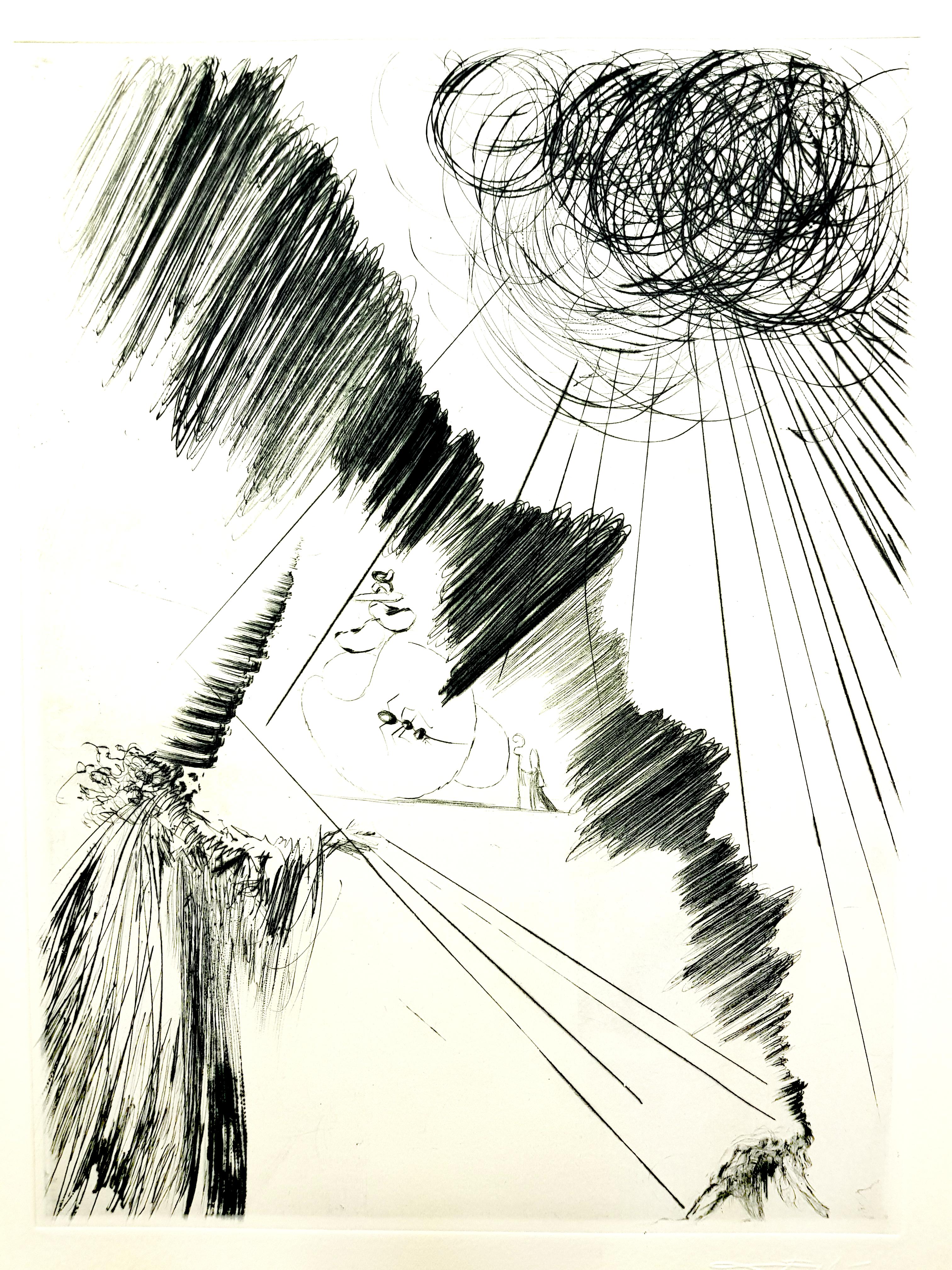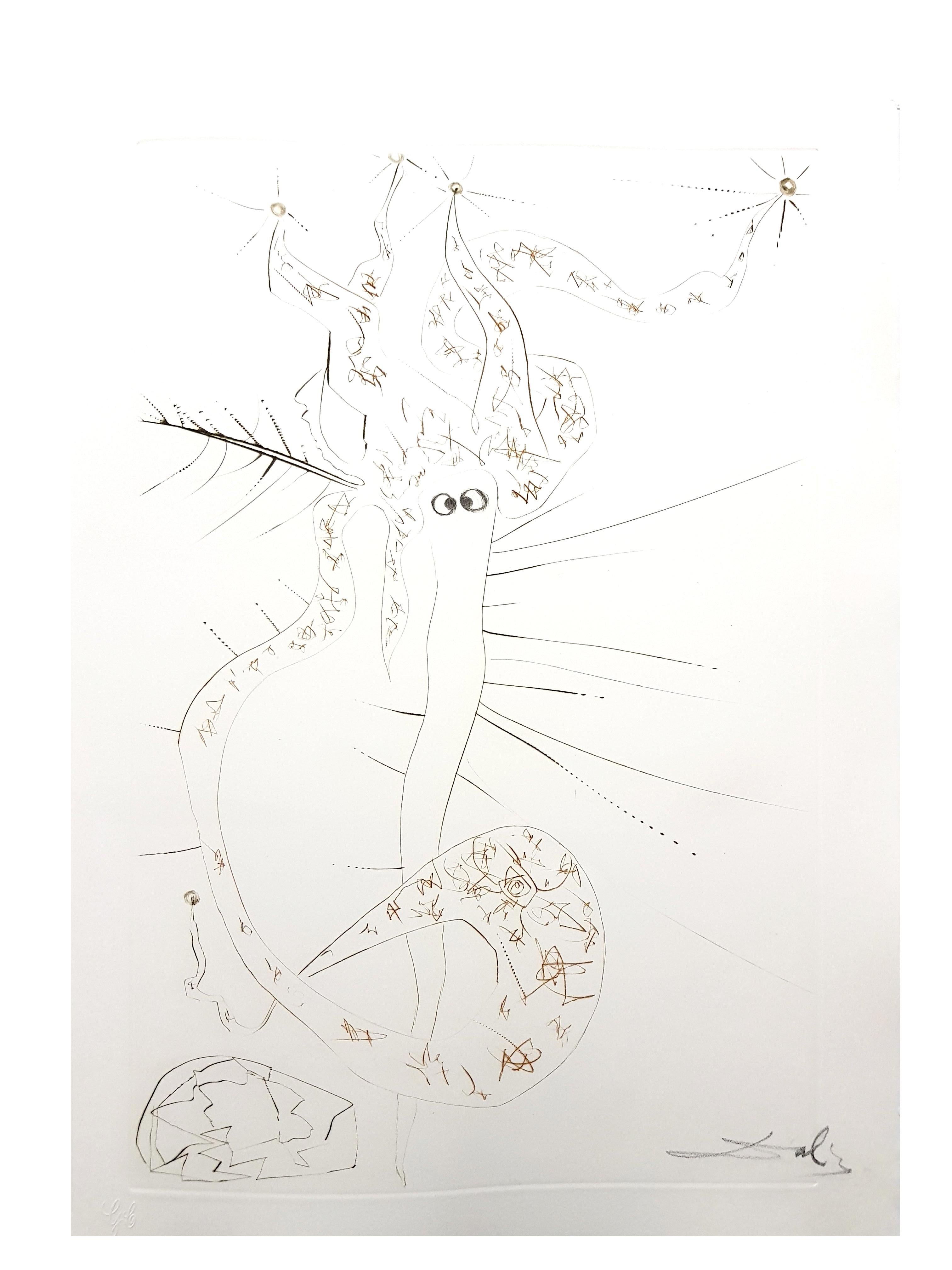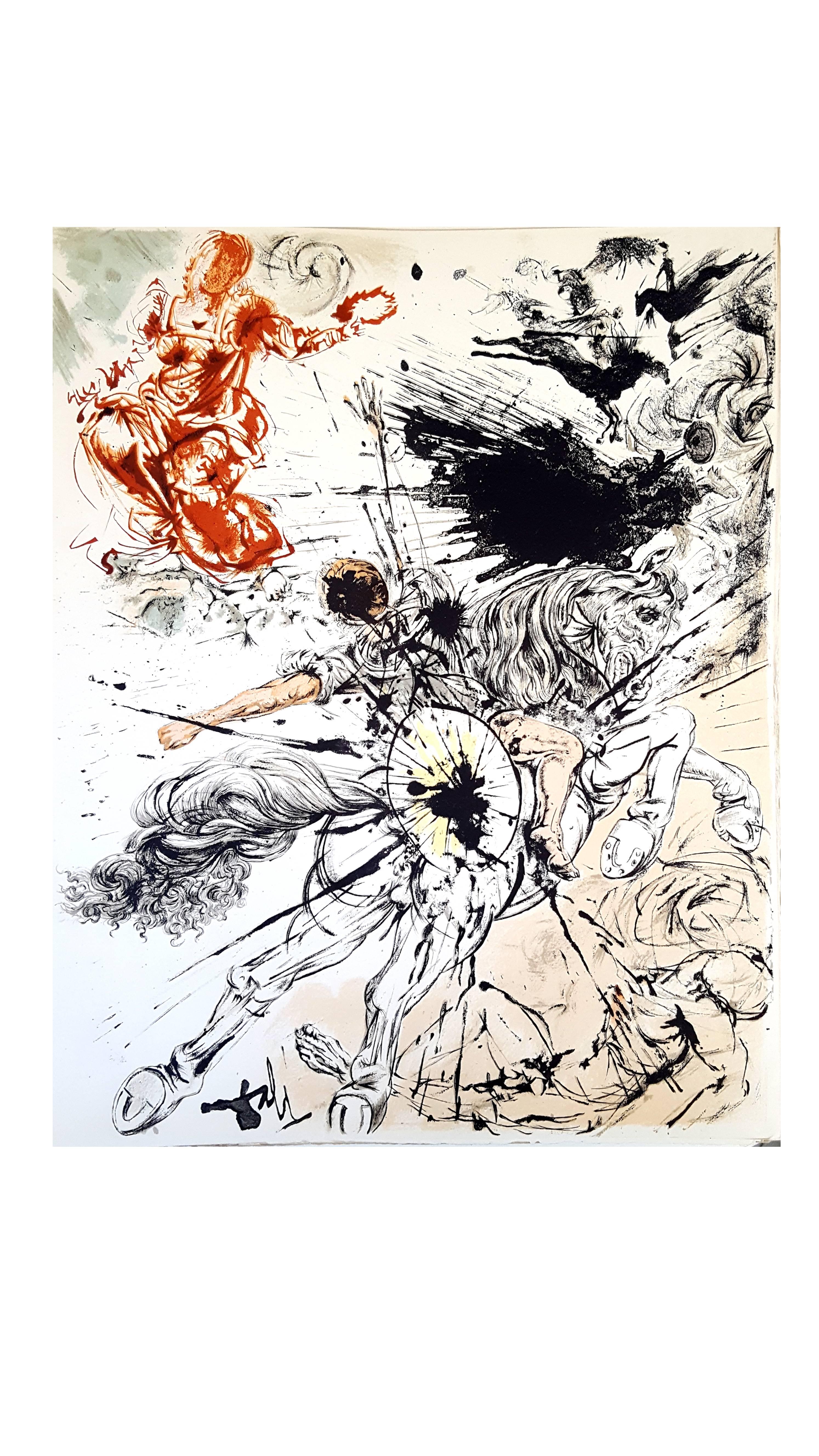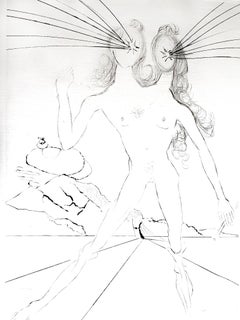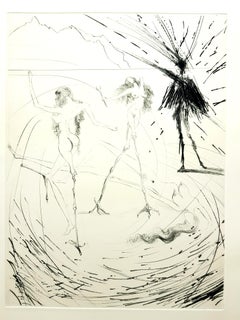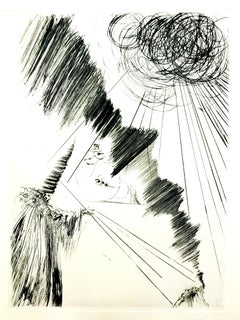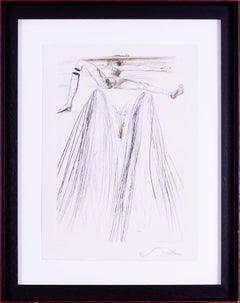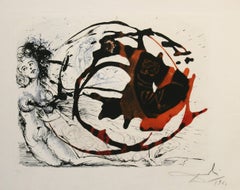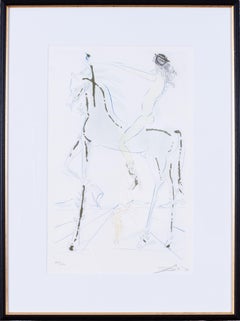Items Similar to Salvador Dali - The Kidnapping - Original Etching on Silk
Want more images or videos?
Request additional images or videos from the seller
1 of 10
Salvador Dali - The Kidnapping - Original Etching on Silk1968
1968
$1,675.62
£1,236.02
€1,400
CA$2,321.65
A$2,520.86
CHF 1,334.98
MX$30,898.52
NOK 16,520.90
SEK 15,611.38
DKK 10,658.01
About the Item
Salvador Dali - The Kidnapping - from "Les Amours de Cassandre"
Original Etching
From the suite on Silk made for editions 9 to 34
Dimensions: 38,5 x 28,5 cm
1968
References : Michler & Löpsinger 255
Very rare etching
Salvador Dali
Salvador Dali was born as the son of a prestigious notary in the small town of Figueras in Northern Spain. His talent as an artist showed at an early age and Salvador Felipe Jacinto Dali received his first drawing lessons when he was ten years old. His art teachers were a then well known Spanish impressionist painter, Ramon Pichot and later an art professor at the Municipal Drawing School. In 1923 his father bought his son his first printing press.
Dali began to study art at the Royal Academy of Art in Madrid. He was expelled twice and never took the final examinations. His opinion was that he was more qualified than those who should have examined him.
In 1928 Dali went to Paris where he met the Spanish painters Pablo Picasso and Joan Miro. He established himself as the principal figure of a group of surrealist artists grouped around Andre Breton, who was something like the theoretical "schoolmaster" of surrealism. Years later Breton turned away from Dali accusing him of support of fascism, excessive self-presentation and financial greediness.
By 1929 Dali had found his personal style that should make him famous the world of the unconscious that is recalled during our dreams. The surrealist theory is based on the theories of the psychologist Dr. Sigmund Freud. Recurring images of burning giraffes and melting watches became the artist's surrealist trademarks. His great craftsmanship allowed him to execute his paintings in a nearly photo-realistic style. No wonder that the artist was a great admirer of the Italian Renaissance painter Raphael.
Salvador Dali and Gala.
Meeting Gala was the most important event in the artist's life and decisive for his future career. She was a Russian immigrant and ten years older than Dali. When he met her, she was married to Paul Eluard.
Gala decided to stay with Dali. She became his companion, his muse, his sexual partner, his model in numerous art works and his business manager. For him she was everything. Most of all Gala was a stabilizing factor in his life. And she managed his success in the 1930s with exhibitions in Europe and the United States.
Gala was legally divorced from her husband in 1932. In 1934 Dali and Gala were married in a civil ceremony in Paris and in 1958 in church after Gala's former husband had died in 1952. However from around 1965 on, the couple was seen less frequently together. But Gala continued to manage Dali's business affairs.
1933 Salvador Dali had his first one-man show in New York. One year later he visited the U.S. for the first time supported by a loan of US$500 from Pablo Picasso. To evade World War II, Dali chose the U.S.A. as his permanent residence in 1940. He had a series of spectacular exhibitions, among others a great retrospective at the Museum of Modern Art in New York.
Besides creating a number of great paintings, Dali caused the attention of the media by playing the role of a surrealist clown. He made a lot of money and was contemptuously nicknamed Avida Dollars (greedy for dollars) by Andre Breton.
Dali became the darling of the American High Society. Celebrities like Jack Warner or Helena Rubinstein gave him commissions for portraits. His art works became a popular trademark and besides painting he pursued other activities - jewelry and clothing designs for Coco Chanel or film making with Alfred Hitchcock.
The Classic Period After World War II
In 1948 Dali and Gala returned to Europe, spending most of their time either in their residence in Lligat or Spain or in Paris or France or in New York. Dali developed a lively interest in science, religion and history. He integrated things into his art that he had picked up from popular science magazines.
Another source of inspiration were the great classical masters of painting like Raphael, Velasquez or the French painter Ingres. The artist commented his shift in style with the words: "To be a surrealist forever is like spending your life painting nothing but eyes and noses."
In 1958 the artist began his series of large sized history paintings. He painted one monumental painting every year during the summer months in Lligat. The most famous one, The Discovery of America by Christopher Columbus, can be seen at the Dali Museum in St. Petersburg in Florida. It is breath-taking. The artist's late art works combine more than ever his perfect and meticulous painting technique with his fantastic and limitless imaginations.
Salvador Dali is the only known artist who had two museums dedicated exclusively to his works at lifetime.
Dali Museum in St. Petersburg, Florida
The Dali Museum in St. Petersburg in Florida or U.S.A. was founded in 1971 by the Dali collector A. Reynolds Morse and his wife Eleanor. The collection was first exhibited in a building adjacent to their home in Cleveland/Ohio.
In 1982, the museum was moved to St. Petersburg in Florida. It hosts 95 oil paintings including six of Dali's eighteen large-sized historical paintings.
Dali Museum-Theater in Figueres, Spain.
The Dali Museum-Theater in Figueres, Spain was the former Municipal Theater of Figueres. In 1918, when Salvador Dali was only fourteen years old, it had shown his first public exhibition.
Since 1970 the artist had dedicated his energy to transform the former Municipal Theater into a museum and art gallery. In 1974 the Theatro Museo Dali was officially opened.
1980 Dali was forced to retire due to palsy, a motor disorder, that caused a permanent trembling and weakness of his hands. He was not able to hold a brush any more. The fact that he could not follow his vocation and passion of painting and the news of Gala's death in 1982 left him with deep depressions.
After Gala's death he moved to Pubol, a castle, he had bought and decorated for Gala. In 1984, when he was lying in bed, a fire broke out and he suffered sever burns. Two years later, a pacemaker had to be implanted.
Towards the end of his life, Dali lived in the tower of his own museum where he died on January 23, 1989 from heart failure. Han
- Attributed to:Salvador Dalí (1904 - 1989, Spanish)
- Creation Year:1968
- Dimensions:Height: 15.16 in (38.5 cm)Width: 11.23 in (28.5 cm)Depth: 0.04 in (1 mm)
- Medium:
- Movement & Style:
- Period:
- Condition:
- Gallery Location:Collonge Bellerive, Geneve, CH
- Reference Number:1stDibs: LU16124429601
About the Seller
4.9
Platinum Seller
Premium sellers with a 4.7+ rating and 24-hour response times
Established in 2015
1stDibs seller since 2015
965 sales on 1stDibs
Typical response time: 1 hour
- ShippingRetrieving quote...Shipping from: Collonge Bellerive, Geneve, Switzerland
- Return Policy
Authenticity Guarantee
In the unlikely event there’s an issue with an item’s authenticity, contact us within 1 year for a full refund. DetailsMoney-Back Guarantee
If your item is not as described, is damaged in transit, or does not arrive, contact us within 7 days for a full refund. Details24-Hour Cancellation
You have a 24-hour grace period in which to reconsider your purchase, with no questions asked.Vetted Professional Sellers
Our world-class sellers must adhere to strict standards for service and quality, maintaining the integrity of our listings.Price-Match Guarantee
If you find that a seller listed the same item for a lower price elsewhere, we’ll match it.Trusted Global Delivery
Our best-in-class carrier network provides specialized shipping options worldwide, including custom delivery.More From This Seller
View AllSalvador Dali - Nude Riding - Original Etching on Silk
By Salvador Dalí
Located in Collonge Bellerive, Geneve, CH
Salvador Dali - Nude Ridding - from "Les Amours de Cassandre"
Original Etching
From the suite on Silk made for editions 9 to 34
Dimensions: 38,...
Category
1960s Surrealist Nude Prints
Materials
Etching
Salvador Dali - Bicephale - Original Etching on Silk
By Salvador Dalí
Located in Collonge Bellerive, Geneve, CH
Salvador Dali - Bicephale - from "Les Amours de Cassandre"
Original Etching
From the suite on Silk made for editions 9 to 34
Dimensions: 38,5 x...
Category
1960s Surrealist Nude Prints
Materials
Etching
Salvador Dali - Women - Original Etching
By Salvador Dalí
Located in Collonge Bellerive, Geneve, CH
Salvador Dali - Women - Original Etching
Embossed signature
From the edition of 731
Dimensions: 38,5 x 28,5 cm
1969
References : Field 69-1 / Michler & Lopsinger 305
Category
1960s Surrealist Nude Prints
Materials
Etching
Salvador Dali - Magician - Original Etching
By Salvador Dalí
Located in Collonge Bellerive, Geneve, CH
Salvador Dali - Magician - Original Etching
Stamp Signed
Dimensions: 38,5 x 28,5 cm
1969
References : Field 69-1 K / Michler & Lopsinger 305
Salvador Dali
Salvador Dali was born as the son of a prestigious notary in the small town of Figueras in Northern Spain. His talent as an artist showed at an early age and Salvador Felipe Jacinto Dali received his first drawing lessons when he was ten years old. His art teachers were a then well known Spanish impressionist painter, Ramon Pichot and later an art professor at the Municipal Drawing School. In 1923 his father bought his son his first printing press.
Dali began to study art at the Royal Academy of Art in Madrid. He was expelled twice and never took the final examinations. His opinion was that he was more qualified than those who should have examined him.
In 1928 Dali went to Paris where he met the Spanish painters Pablo Picasso and Joan Miro. He established himself as the principal figure of a group of surrealist artists grouped around Andre Breton, who was something like the theoretical "schoolmaster" of surrealism. Years later Breton turned away from Dali accusing him of support of fascism, excessive self-presentation and financial greediness.
By 1929 Dali had found his personal style that should make him famous the world of the unconscious that is recalled during our dreams. The surrealist theory is based on the theories of the psychologist Dr. Sigmund Freud. Recurring images of burning giraffes and melting watches became the artist's surrealist trademarks. His great craftsmanship allowed him to execute his paintings in a nearly photo-realistic style. No wonder that the artist was a great admirer of the Italian Renaissance painter Raphael.
Salvador Dali and Gala.
Meeting Gala was the most important event in the artist's life and decisive for his future career. She was a Russian immigrant and ten years older than Dali. When he met her, she was married to Paul Eluard.
Gala decided to stay with Dali. She became his companion, his muse, his sexual partner, his model in numerous art works and his business manager. For him she was everything. Most of all Gala was a stabilizing factor in his life. And she managed his success in the 1930s with exhibitions in Europe and the United States.
Gala was legally divorced from her husband in 1932. In 1934 Dali and Gala were married in a civil ceremony...
Category
1960s Surrealist Nude Prints
Materials
Etching
Salvador Dali - Mad Tristan - Original Etching
By Salvador Dalí
Located in Collonge Bellerive, Geneve, CH
Salvador Dali - Mad Tristan - Original Etching
Dimensions: 45 x 33 cm
Edition: 125
1970
Signed in pencil.
On Arches Vellum
References : Field 70-10 (p. 60-61)
Category
1970s Surrealist Nude Prints
Materials
Etching
Salvador Dali - Apparition de Dulcinée - Original Lithograph
By Salvador Dalí
Located in Collonge Bellerive, Geneve, CH
Salvador Dali - Apparition de Dulcinée - Original Lithograph
Joseph FORET, Paris, 1957
SIGNATURE : printed in the image
LIMITED : 197 copies.
SIZE : 41 x 33 cm
REFERENCES : Field 57...
Category
1950s Surrealist Figurative Prints
Materials
Lithograph
You May Also Like
Thou art all faire, my love: there is no spot in thee, Etching by Salvador Dali
By Salvador Dalí
Located in Long Island City, NY
An original hand-signed Dali etching framed in a museum white-gold leaf frame with silk matting and silver bevel.
Artist: Salvador Dali
Title: Thou art all faire, my love: there is ...
Category
1970s Surrealist Nude Prints
Materials
Etching
Salvador Dali etching, signed with monogram, Le Géant Beliagog
By Salvador Dalí
Located in Petworth, West Sussex
Salvador Dalí (Spanish, 1904–1989)
Le Géant Beliagog (The Giant Beliagog)
Drypoint etching in colour
From the 1970 Tristan and Iseult series, British book edition, printed on Mandeur...
Category
20th Century Surrealist Figurative Prints
Materials
Etching
The Milky Way ( La Voie Lactee ) Etching by Salvador Dali The Mythology suite
By Salvador Dalí
Located in Paonia, CO
The Milky Way ( La Voie Lactee ) is from The Mythology Suite by Salvador Dali. It is the fourteenth plate created out of sixteen in the years 1960-...
Category
1960s Surrealist Figurative Prints
Materials
Etching
Signed and numbered Salvador Dali etching with gold dust on arches paper
By Salvador Dalí
Located in Petworth, West Sussex
Salvador Dali (Spanish, 1904 – 1989)
The beloved is as fair as a company of horses
Etching with gold dust on arches.
Signed and numbered ‘204 / 250’ (lower left) and ‘Dali’ (lower ...
Category
20th Century Surrealist Animal Prints
Materials
Etching
Salvador Dali, signed and numbered drypoint etching, Les Coche et la Mouch, 1974
By Salvador Dalí
Located in Petworth, West Sussex
Salvador Dali (Spanish, 1904-1989)
Le Coche et la Mouche (The Coach and the Fly) 1974
Drypoint etching on Japan paper
Signed and numbered '79/250' (lower left) and 'Dali' (lower righ...
Category
20th Century Modern Figurative Prints
Materials
Drypoint, Etching
Salvador Dalí (1904-1989) - Drypoint etching on Lana paper - 1970
By Salvador Dalí
Located in Varese, IT
Drypoint etching on Lana paper, edited in 1970.
Limited edition of 175 copies, numbered as 150/175 in lower left corner.
Hand-signed by artist in pencil in the lower right corner.
P...
Category
1970s Surrealist Prints and Multiples
Materials
Paper, Etching
More Ways To Browse
Holocaust Sculpture
Hula Dancer
Human Size Sculptures
Jim Nutt
Kaws Bronze
Kaws Open Edition
Longhorn Oil Painting
Louis Pasteur
Macaw Painting
Memento Mori Painting
Michael Childers
Michael Horse
Milan Italy Painting
Nicholas Robert
Oil Paintings Of Swans
Outdoor Corten Steel Sculpture
Owl Original Painting
Paint Can Sculptures
